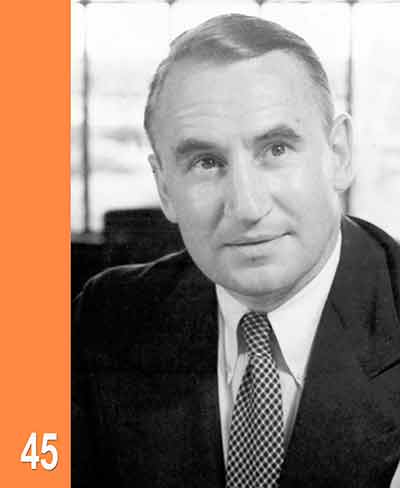Frank Ahlgren
Induction Year:¬Ý2007
Lived:¬Ý1903-1995
Papers:
The Commercial Appeal, Memphis; Duluth (Minnesota) Herald; Milwaukee Journal; The Evening Appeal, Memphis; Cleveland Press
Frank Ahlgren's editorship of The Commercial Appeal spanned some of the most turbulent times in Memphis and the Mid-South he helped to build, from 1936 to his retirement in 1968.
Mr. Ahlgren began his journalism career as a high school correspondent for the Superior (Wisconsin) Evening Telegram, earning $115 a month while he completed his education at Superior State College. He also spent a year at the University of Wisconsin, and recalled a lanky member or his ROTC platoon later to become famous as an aviator. His name was Charles A. Lindbergh.
Mr. Ahlgren attended the University of Wisconsin at Racine, and received a civil law degree from Southwestern University. He later worked for the Duluth (Minnesota) Herald and the Milwaukee Journal.
Mr. Ahlgren came to Memphis from his native Wisconsin in 1926 wearing a white wool suit in typically sweltering Memphis summer weather. He joined a new newspaper, The Evening Appeal, as managing editor. When that newspaper closed in 1933, Mr. Ahlgren was briefly Sunday editor of The Commercial Appeal before joining the Texas Press Association as counsel and lobbyist.
Missing newspapering, he then worked briefly for the Cleveland Press before he was named editor of The Commercial Appeal. He was 33 years old. During his editorship, The Commercial Appeal added to its renown as "The Bible of the Mid-South," championing industrial development and government reform.
In his obituary, The Commerical Appeal wrote that Mr. Ahlgren and Edward J. Meeman, the editor of the old Memphis Press Scimitar, had major roles on the Memphis Community Relations Committee to integrate public facilities peacefully. "He played a key role," according to the obituary, "in ridding Memphis of Jim Crow and political machines. He presided over the newspaper when an assassin killed Dr. Martin Luther King, Jr."
Mr. Ahlgren was a force for industrial development and political. By endorsing Republican presidential candidates starting in 1940, he helped usher in the two-party system to the Mid-South.
He believed in serving his community. "An editor," Mr. Ahlgren wrote, "is under a special obligation to do more than anyone else because a newspaper office has an amazing opportunity to translate ideas into practice. In a sense the newspaper is not the editor's but the property of the community."
Mr. Ahlgren knew a wide range of people, from presidents starting with Herbert Hoover, to the legendary Memphian Ed "Boss" Crump to Elvis Presley. As an influential editor known for his fairness, Mr. Ahlgren became a formidable public servant.
Appointed to the University of Tennessee Board of Trustees in 1948, he served for 27 years. Mr. Ahlgren secured trustee support for creation of the School of Journalism (now the School of Journalism and Electronic Media), and was instrumental in convincing the board to create the College of Communications (now the College of Communication and Information). With his urging, a building then under construction for the University Extension Division in 1969 became the home of the new college.
Mr. Ahlgren also was a major force in the Accrediting Council, an organization certifying that journalism and mass communication education programs met basic standards. Mr. Ahlgren even persuaded a friend from the council - Dean DeWitt C. Reddick of the University of Texas-Austin - to serve for a year as Founding Dean for the new UT college. Late in life, Mr. Ahlgren led the way in funding the Frank Richard Ahlgren Endowment for the College of Communnications to provide major support for the School of Journalism.
In 1932, Mr. Ahlgren married Elizabeth Alley of Memphis, whom he had met in 1931 while she was a student at Southwestern College (now Rhodes College). She came from a remarkable newspaper family. Her father, J.P. Alley, was a Pulitzer Prize-winning cartoonist for The Commercial Appeal. Her brother, Cal Alley, was that newspaper's political cartoonist from 1945 until his death in 1970. Both J.P. and Cal Alley were elected to the TPA Hall of Fame. Elizabeth Alley Ahlgren died in 1992 after 60 years of marriage.
The Ahlgrens had three sons: Frank Ahlgren, Jr., a retired reporter with the El Paso Herald-Post; Calvin Ahlgren, retired associate editor of the San Francisco Chronicle, and the late Gibson Ahlgren, who had a career in real estate in Snohomish, Washington. Ahlgren's family still has close ties to UT.
